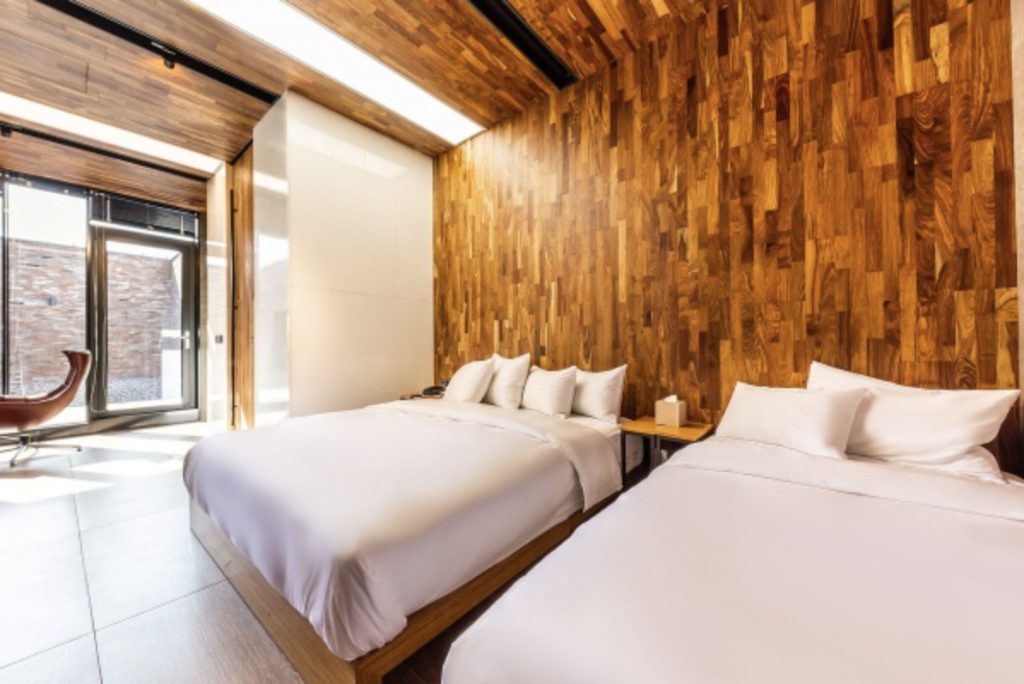Skift Take
It's official and improbable. The South Korean startup Yanolja considers itself a triple threat to hotel tech sellers like Oracle Hospitality, online agencies like Hopper, and mid-market hospitality brands like Sonder. Can it really succeed in all three?
SoftBank Group’s $30 billion Vision Fund 2 has made a $1.7 billion investment in Yanolja, a travel startup based in South Korea, the companies confirmed on Thursday.
The companies didn’t reveal what valuation the investment put on Seoul-based Yanolja, which is an online travel agency, a hotel tech provider, and a hotel operator.
Yanolja had a $1 billion valuation in 2019 when Booking Holdings and Singapore’s sovereign wealth fund GIC participated in a $180 million funding round and collectively took an approximately 35 percent to 40 percent stake in Yanolja.
Yanolja said Softbank Vision Fund 2 was “the sole investor the round,” suggesting that Softbank had diluted booking Holdings’ stake in the company. We couldn’t reach a spokesperson for Booking Holdings by our deadline to ask if the company had sold most or all of its shares in Yanolja to Softbank.
Tokyo-based Softbank runs the world’s largest venture capital fund. Its Vision Fund 2 raised $30 billion and succeeded an approximately $100 billion Vision Fund that had included money from Saudi Arabia and which invested in Oyo, the hospitality company, GetYourGuide, the tours and activities online travel agency, and other companies. Saudi Arabia is not an investor in the Vision Fund 2.
The investment was the largest by a venture fund in a travel startup since the pandemic began. The most recent was when Airbnb received a top-up $1 billion injection by Silver Lake and Sixth Street Partners before it later recovered as a business and had a December 2020 initial public offering.
Softbank said it had “made capital contributions to allow investment” by SoftBank Vision Fund 2 in Yanolja. The fund “has yet to have an external close.” The Financial Times reported the fund had only invested about $13 billion of its funds into startups as of this week.
Despite the pandemic, Yanolja generated a $14 million operating profit on approximately $168 million (192 billion Korean won) in revenue.
Yanolja Plans Tremendous Growth
Today Yanolja is a full online travel agency and a leader in the South Korean online travel market. It also offers through its mobile app categories of products that mimic the Asian “superapp” model, including “lifestyle” categories, such as restaurant reservations, spa passes, attractions ticketing, and rail ticketing. (Skift has covered the supperapp trend.)
On top of that, the company also manages a few hotel brands and has an investment in a budget hotel brand in Southeast Asia, Zen Rooms, that it calls a subsidiary.
“We will accelerate digital transformation in this sector as the global leading hospitality tech company and travel super app,” said CEO of Yanolja Lee Su Jin in a statement.
Last week, Skift reported on Softbank’s interest in Yanolja ahead of other Western media outlets. We noted that Softbank Vision Fund’s interest in Yanolja is particularly in helping the company build, scale up, and run a more advanced “global travel platform.”
Yanolja’s Hotel Tech Software Bet
The company has built a suite of hotel software services that tap automated solutions for hotel operators. It aims to help hotel operators offer more personalized offerings to guests based on big data.
Yanolja’s cloud-based hotel software services, which the company launched in 2019 and Skift profiled last year, aims to compete Oracle Hospitality to a certain extent.
Yanolja told Reuters on Thursday it had some 30,000 licensees, including 9,000 hotel clients in South Korea. It has 6,000 hotels across Indonesia, Singapore, Malaysia, and the Philippines. It plans to enter Vietnam by partnering with VNTravel, the online travel subsidiary of Vietnam’s e-commerce unicorn VNLife. In India, Yanolja has about 6,000 hotel properties as clients, and, in Africa, it has about 3,000.
In May, Yanolja CEO Sujin Lee signed a deal with Citibank Korea to use Citibank’s global connections to expand these services. It plans to “expand license agreements and countries through strategic business alliances with Citibank” and make Citibank’s payment services more readily available to the hospitality industry.
Yanolja believes its client base “should reach 500,000 by 2025,” Reuters reported.
For context, see Skift’s analysis on Yanolja’s outsized ambitions to dethrone Oracle Hospitality’s leading position in hotel software sales.
Softbank is also interested in helping Yanolja become a mobile-first online travel booking brand that competes with Booking.com, Hopper, Expedia, and Trip.com.
“Powered by AI [artificial intelligence], we believe Yanolja is a leader in transforming the travel and leisure industry in South Korea through its ‘travel superapp’ approach,” said Greg Moon, managing partner at SoftBank Investment Advisers, in a statement.
If Yanolja wants to have an initial public offering in the U.S. instead of South Korea, it will need to have more mergers and acquisitions outside of Asia to bolster its claim of having a global scale.
Yanolja had been preparing to go public and had hired Mirae Asset Daewoo and Samsung Securities as underwriters. The pandemic has held back its growth. Delaying a U.S. initial public offering (IPO) to, say, 2023 could allow the startup to present stronger, post-pandemic numbers to investors and lead to a more robust IPO.
In March, Softbank’s Vision Fund successfully saw one of its South Korean portfolio investments, e-commerce company Coupang, debut in a U.S.-based IPO.
Yanoja didn’t discuss its interest in going public or any timetable in its statements on Thursday.
The Daily Newsletter
Our daily coverage of the global travel industry. Written by editors and analysts from across Skift’s brands.
Have a confidential tip for Skift? Get in touch
Tags: corporate venture capital, hotel tech, hotel tech stack, hotel technology, online travel agencies, softbank, startups, venture capital, yanolja
Photo credit: Hotel The Artist Yeonsinnae is a property in Seoul that's bookable via travel app Yanolja. Yanolja
